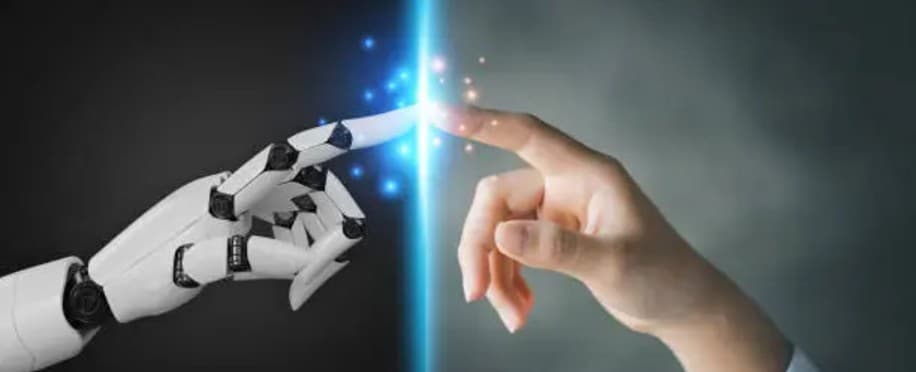Copyright © 2026 lpcentre.com All Rights Reserved. London Premier Centre For Training Ltd Registered in England and Wales, Company Number: 13694538
version: 3.0.1

AI vs Human Talent: Jobs Algorithms Will Never Outskill
Posted on : 11/24/2025, 1:19:58 PM
Last Update : 11/24/2025, 1:19:58 PM
In a world dominated by algorithms and accelerating digital transformation, AI vs. Human has become more than just a scientific comparison—it's an existential debate on everyone's mind: Can artificial intelligence truly surpass human intelligence?
While machines' data processing capabilities are advancing rapidly, human intelligence remains unique in its ability for understanding, creativity, and emotions, qualities that are difficult for any system to replicate.
Many people today live with the constant anxiety of being replaced by machines, wondering: Will human jobs disappear under the pressure of automation and the AI vs. Human debate? Or will collaboration between the two be the key to building a more balanced future?
Let's be honest—AI vs. Human isn't a battle of "intelligence against intelligence," but rather a journey to discover where the strengths, cognitive abilities, and moral intelligence of each lie, and how they can complement each other to achieve their true potential.
To understand the depth of the AI vs. Human debate, we must start from the beginning: How does artificial intelligence differ from human cognition?
First and foremost, you should know that artificial intelligence relies on processing vast amounts of data and using frameworks and algorithms to learn; But humans, on the other hand, rely on insight, emotions, and experience. While machines excel in efficiency, then humans remain superior in emotional decision-making, ethics, and higher-order thinking.
In contrast, AI vs. Human has different weaknesses and strengths: machines lack nuance in emotions but excel at tireless, continuous cognitive processing. Humans, despite their limited ability to handle large volumes of data, possess resilience and creativity that AI cannot easily replicate.
AI vs. Human is not so much a competition as it is a collaboration that redefines the meaning of intelligence and raises philosophical questions about societal principles and trustworthiness.
Where do the greatest differences between AI and Human appear?
Look no further, here are 5 critical dimensions that illustrate this intellectual and practical conflict:
While AI relies on data-driven processes, thus humans make decisions guided by principles and emotions. Here, the challenge lies in making systems trustworthy without losing the moral compass that distinguishes humans.
The AI vs. Human debate continues in the realm of creativity. Of course, humans derive creativity from conceptual thought, while AI relies on pre-existing patterns in data. Although AI can generate art or music, human sentiment remains the missing element that gives a work its authentic dimension.
Without a doubt, humans learn from experience and demonstrate unique adaptability in new situations, while AI relies on pre-training and fixed models. Not only that, we can say that with the development of technology, systems have become also capable of self-learning, which has made the boundaries of AI vs Human less clear.
It is not surprising that in complex tasks and reasoning, humans remain capable of abstract thinking—while AI excels in optimization and speed. However, human intuition emerges in situations that demand EI and creativity.
Studies have shown that the best results are achieved when the two work together: AI vs Human collaboration produces intelligent systems capable of outsmarting tangible-world challenges by combining data, emotion, and cognition.
This highlights the role of educational programs like AI training courses in Dubai, which help professionals learn how to integrate artificial intelligence with human insight to build smarter and more humane work environments.

This is a question that preoccupies researchers at Stanford, Google, and global science centers: Can AI replace humans?
The answer isn't simple, but here are three pivotal themes of discussion:
The artificial intelligence cannot replace human emotions or the capability for empathy, making certain professions—such as therapists, educators and decision-makers—unprecedented in autonomous systems.
While artificial intelligence excels at communication processing, human interaction is of course far more multilayered. Why? Because it involves emotions, context, and social understanding—elements that remain beyond the grasp of intelligent systems.
The dynamic interplay between AI vs human is not one of conflict, but rather; it's one of evolving collaboration. In this point we can say, humans are learning how to leverage AI's ability to handle big data, while AI is learning from human feedback how to become more relevant and aligned with cultural values.
Accordingly, artificial intelligence courses in Dubai are an ideal destination for professionals wishing to explore the vast possibilities of AI vs Human, and understand how this relationship can reshape the future of work, intelligent systems, and not forgetting ethical frameworks in the modern world.
Ultimately, it is clear that the future of AI vs. Human is not based on competition but on genuine collaboration. The human mind possesses intuition and moral cognition, while artificial intelligence offers limitless performance, data analysis, and innovation.
Whether you are in London, Dubai, Barcelona, Paris, Istanbul, Kuala Lumpur, Singapore, or Amsterdam, London Premier Centre (LPC) Training offers internationally recognized AI training courses designed to meet your local and global needs, supported by flexible teaching methods that help you learn and adapt to the accelerating transformation era of AI vs. Human.
Start your journey today towards an intelligent future—not to choose between AI vs Human, but to discover how the two minds can work together to create a world that is more innovative, efficient, and understanding.